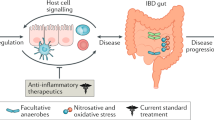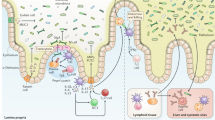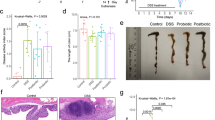Abstract
Inflammatory bowel diseases (IBD) are chronic conditions of unknown etiology. Current therapy mitigates the severity of acute bouts of mucosal inflammation but an eradication therapy is lacking. Growing incidence of IBD is associated with social development. Epidemiology suggests a relationship between the establishment of the individual gut flora and the risk of developing IBD. Patients show an impaired tolerance towards commensal bacteria of the resident flora. Unrestrained activation of the intestinal immune system against some commensal bacteria appears to be responsible for the characteristic relapsing course of these diseases. Wide-spectrum antibiotic therapy reduces bacterial load and mitigates intestinal inflammation in human IBD and in animal models. Current research aims at the identification of probiotics for bacterial antagonism therapies. Probiotics are living microorganisms which upon ingestion in certain numbers exert health benefits beyond inherent basic nutrition. Colonization with a Lactobacillus reuteri strain can prevent the development of colitis in genetically susceptible mice. Other studies have used a bacterium genetically engineered to secrete the antiinflammatory cytokine IL-10 and demonstrated a therapeutic effect in animal models of colitis. Moreover, some probiotics may naturally exhibit antiinflammatory properties when interacting with the human gut mucosa. Prebiotics such as inulin have also been shown to prevent colonic inflammation in animal models. Preliminary clinical trials with probiotics in IBD are encouraging. Probiotics offer a valuable tool for the prevention and control of inflammatory bowel diseases.
This is a preview of subscription content, access via your institution
Access options
Subscribe to this journal
Receive 12 print issues and online access
$259.00 per year
only $21.58 per issue
Buy this article
- Purchase on Springer Link
- Instant access to full article PDF
Prices may be subject to local taxes which are calculated during checkout
Similar content being viewed by others
Author information
Authors and Affiliations
Corresponding author
Rights and permissions
About this article
Cite this article
Guarner, F., Casellas, F., Borruel, N. et al. Role of microecology in chronic inflammatory bowel diseases. Eur J Clin Nutr 56 (Suppl 4), S34–S38 (2002). https://doi.org/10.1038/sj.ejcn.1601662
Published:
Issue Date:
DOI: https://doi.org/10.1038/sj.ejcn.1601662
Keywords
This article is cited by
-
Antibiotic Resistance Capability of Cultured Human Colonic Microbiota Growing in a Chemostat Model
Applied Biochemistry and Biotechnology (2014)
-
Somatic outcome among patients hospitalised for anorexia nervosa in adolescence: disorders reported and links with global outcome
Eating and Weight Disorders - Studies on Anorexia, Bulimia and Obesity (2013)
-
Infektionen mit nichttuberkulösen Mykobakterien bei Patienten mit Immundefekten
Der Pneumologe (2011)
-
Phylogenetic analysis of 16S rRNA gene sequences reveals distal gut bacterial diversity in wild wolves (Canis lupus)
Molecular Biology Reports (2010)



